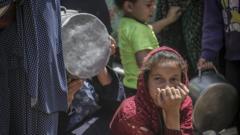Denying food to Gaza is being characterized as a "weapon of war" by the United Nations Refugee Agency chief. The voices of numerous journalists in Gaza, including those who have lost their lives in the conflict, underscore the grim realities faced by civilians caught in this ongoing escalation. Israel's blockade, preventing international journalists from entering Gaza and blocking humanitarian shipments, has left many families struggling for basic survival.
Pascal Hundt, deputy director of the International Committee of the Red Cross, articulated the severe daily challenges faced by civilians in Gaza due to both military aggression and the lack of crucial humanitarian assistance. As the conflict deepens following a resumption of hostilities on March 18, concerns grow over the lack of aid, which has been completely halted since the beginning of the month.
Prime Minister Benjamin Netanyahu, under pressure from hardline supporters, has chosen military escalation over negotiations, rejecting any ceasefire terms that would require significant withdrawals or concessions. His administration faces internal criticism, particularly from families of hostages, who fear that continued fighting prioritizes territorial goals over human lives.
As a result of the blockade, the United Nations has reported alarming levels of food insecurity among Gaza’s population, describing the situation as approaching famine conditions. Philippe Lazzarini, commissioner-general of UNRWA, described the situation as dire, with nearly half of Gazan children facing acute malnutrition without intervention. The data from the Integrated Food Security Phase Classification indicates that 470,000 Gazans are facing a “catastrophe” level of food scarcity.
Lazzarini’s remarks paint a stark picture of the humanitarian crisis while asserting that the denial of food constitutes a war crime, emphasizing that humanitarian aid is being manipulated for political and military gain. He warned that the ongoing humanitarian crisis could escalate into genocide if left unaddressed, correlating the blockade with continued massive atrocities in the region.
Israel's military leaders have openly aligned their strategies with political aims, prioritizing pressure on Hamas through suffering inflicted on civilians. The Israeli government’s approach has led to rare consensus among families of hostages and military reservists, who express discontent regarding the motivations behind the intensified fighting.
As international bodies and various nations begin to vocalize concerns over potential genocide, Netanyahu's government has pushed back, accusing UN officials of spreading falsehoods regarding the blockade and its effects. Tensions remain high amidst allegations of war crimes against multiple parties involved in the conflict.
The long-term repercussions of this crisis are slowly coming into focus, with analysts predicting that historical perspectives may one day view this phase as a catastrophic failure of the international community to intervene. The narrative surrounding the ongoing crisis underscores a potentially dark future, where notions of peace and coexistence seem increasingly unattainable.


















